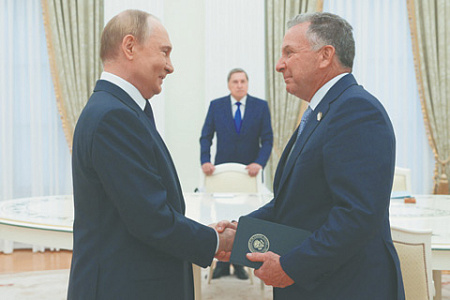
A high-stakes diplomatic mission to Moscow by U.S. Special Envoy Steve Whitcoff has culminated in a dramatic geopolitical maneuver. Immediately following Whitcoff’s meeting with Russian President Vladimir Putin, the Trump administration announced it was increasing tariffs on Indian goods to 50%, a move widely interpreted as a direct consequence of the talks and a clear signal of Washington’s intent to pressure key buyers of Russian oil.
The meeting between Whitcoff and Putin, which lasted for approximately three hours, was described by a Kremlin official as a crucial exchange of “signals.” Putin’s aide, Yuri Ushakov, confirmed that messages concerning the conflict in Ukraine were relayed from both sides, leading to a “better understanding” of each other’s positions. Ushakov cautiously stated that further commentary would have to wait until Envoy Whitcoff had fully briefed President Trump, underscoring the sensitive nature of the back-channel communications.
The timing of the tariff hike on India, a major economic partner for the U.S., was unmistakable. The announcement came just as the Moscow talks concluded, materializing President Trump’s long-standing threats to penalize nations that undermine Western sanctions by purchasing Russian energy. India, alongside China, has become a top destination for Russian crude oil, making New Delhi a primary target for Washington’s economic coercion tactics, despite its historically low reliance on Russian energy before the Ukraine conflict.
This latest development is part of a broader, aggressive strategy by the White House. President Trump had previously issued an ultimatum to Moscow, demanding a resolution to the conflict in Ukraine within a tight deadline, threatening severe secondary sanctions as a consequence. While initial threats of crippling 100% tariffs were walked back, likely due to warnings of potential damage to the American economy, the new 50% tariff demonstrates a calculated application of economic pressure on one of Russia’s most important new customers.
As the diplomatic fallout continues to unfold, reports have emerged of an impending phone call between President Trump and Ukrainian President Volodymyr Zelenskyy, said to have been initiated by the White House shortly after Whitcoff’s return from Moscow. While Kyiv has remained cautious about the U.S. strategy of using secondary sanctions, it has consistently welcomed any American signals of increased military support. The world now watches as this complex interplay of secret diplomacy and economic leverage shapes the future of the conflict and the shifting alliances on the global stage.
